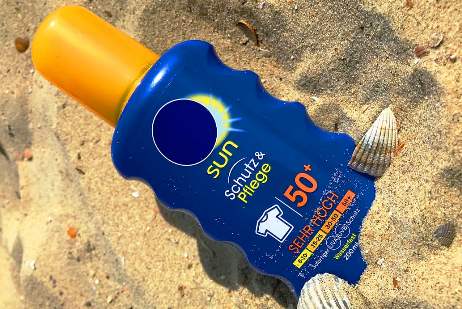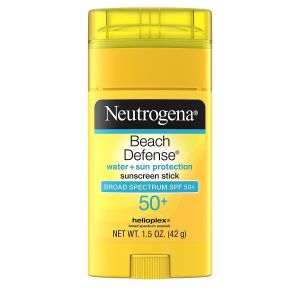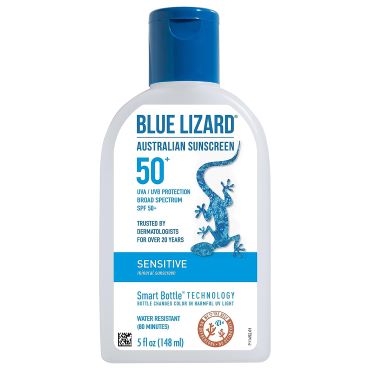Does Sunscreen Wash off in Water? Find Out Here
Does swimming wash off sunscreen, thus requiring reapplication of the same throughout the day?
Hold on right there … we will come to that a little later.
Sunscreen is an essential component of our skincare routine, especially during the summer when the swimming season kicks in.
Because of the sun protection factor, it helps protect our skin from the harmful UV rays of the sun, which can cause skin damage, premature aging, and even skin cancer.
But one question that often arises is whether swimming in the ocean, saltwater or chlorine pool will wash the sunscreen off your skin.
If yes, how much protection of the same is washed from your skin?
So, does swimming wash off sunscreen?

Yes, but how badly depends on the type of sunscreen that you have applied to your skin. If it is not the water-resistant type, it will wash away fast.
When you swim, the water and the motion of the water can cause the sunscreen to rub off or wash away, leaving your skin unprotected.
Therefore, you are advised to reapply sunscreen immediately after you get out of the water. When you are not swimming, it is recommended to apply sunscreen every two hours.
When you are swimming, reapply as soon you get out of the water, and then from there, reapply every two hours.
But if you use a water-resistant sunscreen, it will stay on your skin for a longer time.
Water-resistant vs. waterproof sunscreen
The American Academy of Dermatology (AAD) says that water-resistant sunscreen provides protection for up to 40 to 80 minutes of swimming or sweating.
On the other hand, waterproof sunscreen provides protection for up to 80 minutes of swimming or sweating.
There isn’t a sunscreen that is 100 percent waterproof or sweat proof. All of them require reapplication after swimming or sweating to maintain their effectiveness.
Choosing the right sunscreen for swimming
The main reason for wearing sunscreen when swimming is to block the sun’s rays. But did you know that the rays come in different types?
When choosing a sunscreen for swimming, look for a water-resistant or waterproof formula with an SPF of at least 30.
The AAD says that an SPF of 30 blocks about 97% of UVB rays, which cause sunburns, and they also contribute to skin cancer.
If you are going to be in the water for an extended time, choose a sunscreen with a higher SPF to provide additional protection.
Another important consideration is to look for sunscreen that has the “broad-spectrum” label. Such products protect your skin against both UVA and UVB rays.
The UVA rays cause the degeneration of the skin, and in return, this brings premature aging. The UVB rays cause sunburn and contribute to the development of skin cancer.
The effects of swimming on sunscreen effectiveness
Studies have shown that swimming can reduce the effectiveness of sunscreen, especially when the sunscreen is not water-resistant or waterproof.
A study published in the Journal of the American Academy of Dermatology found that swimmers who used a water-resistant sunscreen were less likely to get sunburned than those who used a regular sunscreen.
Another study published in the Journal of Photochemistry and Photobiology found that water immersion can cause the loss of up to 50% of the applied sunscreen.
These studies highlight the importance of using a water-resistant or waterproof sunscreen when swimming, as well as reapplying it regularly.
Please also note that swimming in salt water or chlorinated water can further reduce the effectiveness of sunscreen. Taking extra precautions is necessary before you can swim.
Can I use normal sunscreen for swimming?
You cannot use the regular sunscreen for swimming. It is recommended that you use the waterproof sunscreen for your swimming activity.
It is recommended that you wear sunscreen every time you are going outside your house. This applies even when you are swimming. You should have a sunscreen for swimming in a saltwater or chlorine pool.
For swimming, I recommend you get the Neutrogena Beach Defense Water-Resistant SPF 50+ that you can order on Amazon.com.
This is a high-quality sunscreen that is certified safe for reefs. Therefore, you can use it even when swimming in the ocean.
With a sun protection factor of 50+, it is going to protect your skin against the UVA and UVB rays of the sun.
The UVA rays are long-wavelength UV rays, that penetrate the outer layers of the skin and cause cell damage, fast aging, and other ill effects.
The UVB rays are notorious for causing sunburns.
The good thing is that this is not a swimming-only sunscreen. You can use it as your daily before you step out of the house.
It also helps matters a lot that this product is affordable, so you can order two or more of them without feeling the pinch.
Which is better for swimming: sunblock or sunscreen?
This is a common question among people who love to swim in the sea, as well as in the swimming pool.
While most people mistake sunscreen for sunblock, and vice versa, well, these are not the same at all. The only characteristic that they share is that they give you protection against the sun.
As you can tell from the names, the sunscreen screens, or filters the rays of the sun. While it is good at this, not all sun rays can be filtered, so some still do manage to penetrate the skin. Sunscreens are thinner, and they are absorbed into the skin. They contain avobenzone and oxybenzone.
Sunblock blocks the sun’s rays completely and deflects them. That way, they do not affect the skin. Sunblocks are thick, and they leave a whitish layer on the skin. They are made with titanium oxide.
Now that we know the differences between the two, which one can you use for swimming? You can use either, but because sunblock contains zinc and titanium oxide, well, it is more effective. Therefore, sunblock is better for swimming than sunscreen.
Today, you will hardly find products containing the word “sunblock.” Therefore, you should look at the ingredients to know what is sunblock and what is sunscreen.
The best sunblock for swimming that you can buy on Amazon is the BLUE LIZARD Sensitive Mineral Sunscreen with Zinc Oxide. It has a sun protection factor of 50+.
Alternative sun protection methods for swimming
Even after wearing your sunscreen, you still need to do some other things to protect your skin from the effects of the sun.
Your protection starts with choosing the right swimming attire. Wearing protective clothing such as rash guards, hats, and sunglasses can help to block the sun’s rays from reaching your skin.
If the sun gets too hot, please get out of the water and stay in the shade. You can always swim later in the evening when the weather has toned down a bit.
Sun protection is a comprehensive effort that involves multiple methods. Cover up as much as possible, but remember to apply sunscreen all the time. This is the main factor that provides protection all the time.
Check my articles on:
How to swim in the Great Salt Lake
Is polyester good for swimming?
Conclusion
Never expose yourself to the sun unnecessarily. After wearing your swimming trunks, apply sunscreen to all the exposed parts.
Data from the Skin Cancer Foundation shows that 1 in 5 Americans will develop skin cancer in their lifetime.
This is also the most common type of cancer in the United States, and more than 9,500 people are diagnosed every day.
You must always bear these facts in mind when you are going swimming. Wearing sunscreen is one of the most effective ways to protect yourself from skin cancer, but you should also use other recommended methods.


